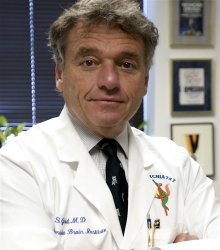UF’s addiction medicine residency training among 10 in nation to be accredited
 Mark Gold, M.D., an international authority on addiction medicine, and chairman of the University of Florida College of Medicine's department of psychiatry. (Photo by Sarah Kiewel/University of Florida)
Mark Gold, M.D., an international authority on addiction medicine, and chairman of the University of Florida College of Medicine's department of psychiatry. (Photo by Sarah Kiewel/University of Florida)
The University of Florida College of Medicine’s addiction medicine residency training program was one of only 10 in the nation to receive accreditation from the American Board of Addiction Medicine Foundation in April.
Nine other programs associated with institutions such as Boston University Medical Center and the University of Maryland Medical System also received ABAM accreditation.
“This is a major achievement for our department and College of Medicine,” said Mark Gold, M.D., chairman of the department of psychiatry. “The American Board of Addiction Medicine saw our bench-to-bedside excellence and experience mentoring and training and made the correct decision to choose UF as one of its initial training sites.”
UF will accept up to three residents in 2011-12 to train at the Florida Recovery Center, where they will make clinical rounds with attending physicians in the addiction medicine inpatient unit. Residents will also participate in group therapy sessions.
UF has had fellowships in addiction medicine for years, but the residency program is something new, said Scott A. Teitelbaum, M.D., director of the addiction residency program and medical director of addiction services at the Florida Recovery Center. Addiction fellows have come from all specialties from pediatrics to neurosurgery, he said.
“This is a big step for the field of addiction medicine,” he said. “It’s a milestone to get a residency, so it’s neat to be one of the first ones.”
Residencies start in July. UF has spots for four to five addiction residents a year and is still choosing applicants for the program, Teitelbaum said.
UF has both a nationally recognized treatment center, but also is a leader in addiction teaching, he said.
In addition, basic and clinical addiction research in the areas of drug abuse, drug effects on the brain and behavior, and addiction as a disease is a hallmark of UF’s McKnight Brain Institute, Gold said.